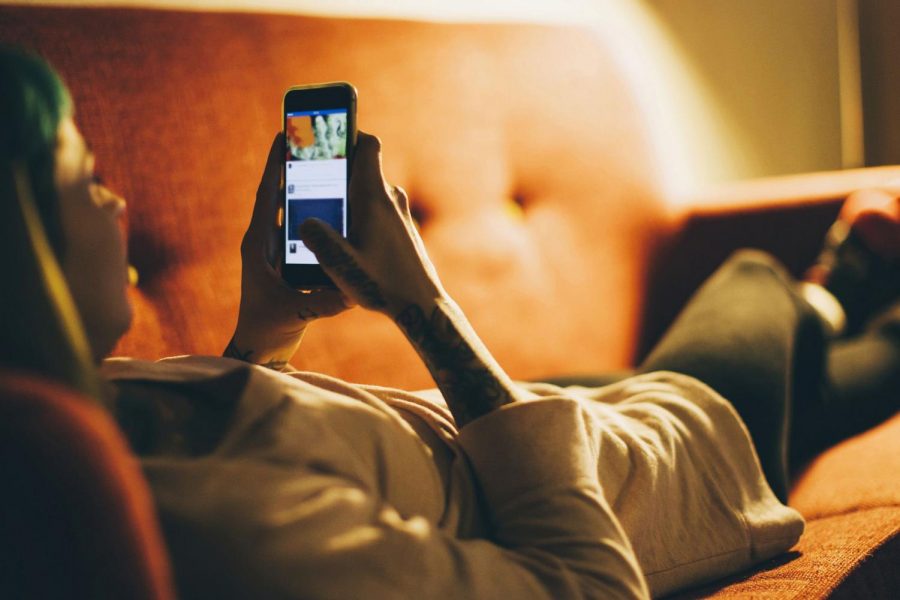How social media is making you more lonely
Social media platforms are making people more lonely than ever before
Ten years ago, in October 2010, Instagram was officially released to the world. The photo sharing app quickly gained popularity and had over a million registered users within two months, 10 million users within a year, and continued to grow at an astonishingly rapid rate in the following years. At the same time, however, the rate of young adults with suicidal thoughts or other suicide-related outcomes increased an alarming 47 percent from 2008 to 2017 according to a National Survey on Drug Use and Health.
Coincidence?
Today, more than ever, teens are turning to social media to connect with friends and stay up to date on each other’s lives. A Harris Poll survey from May 2020 shows 51 percent of total respondents reporting increased usage on social media platforms from the beginning of the coronavirus pandemic. Teens look to social media for comfort and connection, so why are we still so lonely?
Social media continues to grow in popularity as the most effective way to stay in touch with people, but is actually making teens feel more lonely than ever before. Adolescents are reporting increasingly high levels of stress and social pressure, and there has been an epidemic spike in the number and frequency of teens being diagnosed with severe anxiety and depression, along with terrifying trends in self-harm, eating disorders, bullying and suicide. San Diego State University psychologist Jean Twenge stated when researching for her book “iGen,” “We found a substantial increase in major depression or suicidal thoughts, psychological distress, and more attempted suicides after 2010, versus the mid-2000s, and that increase was by far the largest in adolescents and young adults.” The time frame during which teen mental health took a turn for the worse directly correlates to the rise of social media. This cannot be a mere coincidence.
People may argue that social media is the best and most convenient way to stay connected with family and friends, especially during this time of isolation and quarantine. While social media is convenient entertainment, is it really creating the kinds of connections you think it is? People claim that they spend time scrolling, liking, and commenting on posts to connect and communicate with others, however, what if the feeling of connection is actually just an illusion? What if social media is actually making you feel more lonely in the long run?
A social media feed is filled with other people’s “highlight reels;” it’s filled with all the best and most noteworthy parts of other people’s lives. After all, no one posts unedited, unfiltered, and uncaptioned pictures of themselves sitting on their bed scrolling through their phone, when that is the reality of how so many teens spend their free time. Instead, people post the single best picture out of hundreds they took, or they post a picture from a vacation that ended weeks ago. Social media doesn’t show the whole picture, only the best parts. So when you’re “connecting” with your friends, you’re really only connecting with a snapshot of their life. In order to truly connect with people, you need to be engaging with more than just a couple of their online posts.
In addition to a false sense of connection, social media promotes an immense amount of negative comparison. When comparing your everyday, mundane tasks to a few snapshots of the best parts of someone else’s life, it’s bound to make you question why your life isn’t as fun or interesting as theirs. In reality, the person you’re comparing yourself to is probably comparing themselves to someone else’s “highlight reel” at the same time, creating a vicious cycle of comparison and feelings of inadequacy. This negative comparison and false sense of connection ultimately leaves adolescents feeling worse than when they initially opened social media looking to connect with peers. Teens are often left still feeling lonely after hours online. This continued feeling of loneliness can drive teens to spend even more time on social media seeking connection, which leads to yet another vicious cycle that never fulfills the interactive social experiences teens actually need.
Although social media can be convenient and useful in some situations, the rate at which teens use it today is alarming and harmful, as told by the terrifying trends of mental health issues. Especially during a pandemic, when stress levels are already elevated, staying in touch with others is essential, but social media isn’t the best option. Teens need face-to-face, personal interactions to feel connected to their community because although it may seem convenient, social media simply cannot create the same feelings of togetherness as a FaceTime call or socially distanced gathering. So next time you find yourself mindlessly scrolling, I urge you to reconsider and instead opt for a more interactive or face-to-face connection. Your mental health and wellbeing are at stake.


